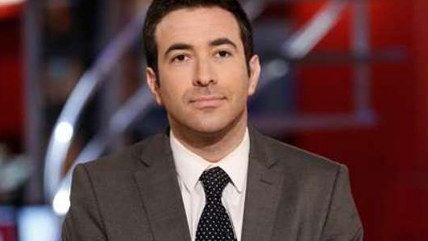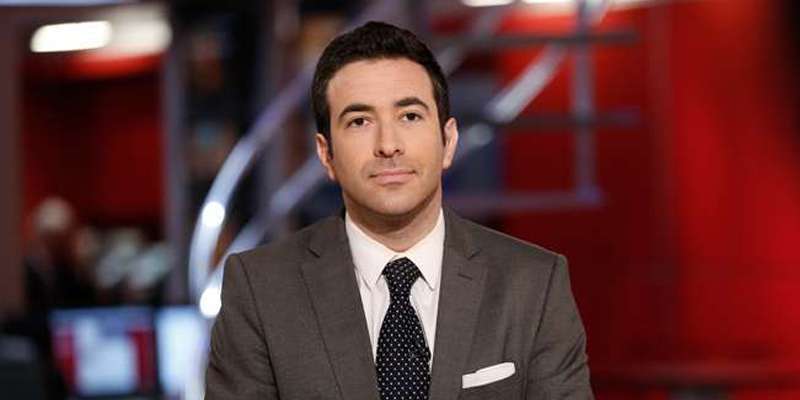Meet the MSNBC Legal Eagle Who Proposes Destroying the Free Press
It's not on purpose, but Ari Melber's proposal to treat 'fake' news as consumer fraud would have devastating consequences.


It's the early days of a presidency that has openly declared itself to be hostile to the media (and to be fair—the reverse is also true), and Ari Melber, MSNBC's legal correspondent and a lawyer, has what he thinks to be a brilliant idea—let's have the federal government get more involved in evaluating the legitimacy of news.
I'm not a big MSNBC viewer, but I'm fairly sure that they haven't suddenly become big supporters Donald Trump's presidency. That's not what Melber is going on about. Rather, what Melber has suggested is that the federal government, particularly the Federal Trade Commission (FTC), can use its authority to protect consumers from fraudulent advertising claims in order to fight the existence of "fake news." He suggests that by classifying disprovable media claims as fraudulent, the government has the authority to intervene. "Fraud" is not considered protected speech. He makes the case in a piece for the New Jersey State Bar Association:
To follow First Amendment precedents, the framework could limit the FTC to only regulating posted articles—not seeking prior restraints against future articles—and to only regulate businesses devoted to fraud news.
Legally, a focus on deceptive businesses keeps the FTC in the ballpark of commercial speech, patrolling deceptive practices taken in pursuit of commerce. During the election, the most popular fraud news sites were launched by business people, often abroad, enticed by the market online for political news. They were trying to make money, not express any particular view. …
Since these sites are clearly operating as businesses, it is logical to regulate their commerce and deceptive practices like any other business.
A focus on deceptive businesses would also keep the government away from meddling with actual journalists or citizens exercising their right to lie while engaged in politics.
Where to begin here. First of all most media outlets—whether legitimate or "fake"—are trying to make money, most were launched "by business people," and many are not trying to express any particular view. But some are. "Making money" and "expressing any particular view" are neither opposing choices, nor or they determinants of the validity of the existence of a media outlet. And that a media outlet might be a venture designed to make money doesn't mean it suddenly becomes exempt from the First Amendment protections that the government cannot censor the press.
But that's just semantics (and frustration at people who work in the media who think they aren't already engaged in acts of commerce). The much bigger, so much more important issue here is what it would actually look like were a government agency to decide that it can use a tool to fight consumer fraud to monitor the legitimacy of news.
We already saw what happened when the whole latest outburst about "fake news" happened during the election. People went looking for resources that separated "real" news from "fake" news and we ended up in a place where media outlets with heavily ideological slants were dumped in with media outlets that were deliberately making up stuff.
You don't have to go very far to determine what could happen when a politicized apparatus (and every government agency is partly political) can have control over what can be defined as "fraud" when it comes to information. You don't even have to leave this site! Several attorneys general for states across the country have teamed up to go after ExxonMobil for its participation in the larger debate over climate change. They have decided to attempt to prove that ExxonMobil knew more about what was going on with the burning of fossil fuels and the environment and deliberately attempted to mislead investors and customers. They are attempting to reclassify the debate (free speech) as deliberate consumer fraud (not free speech).
To do so, they've attempted to subpoena decades of communications between ExxonMobil and various policy groups in order to fish for information they hope will make that case. One of the policy groups targeted is the Reason Foundation, the nonprofit think tank that publishes Reason.com and Reason magazine. Reason was dragooned into a highly politicized case where government officials deliberately attempted to reclassify public debate as "fraud" in order to target a disliked business. One of the AGs involved, Kamala Harris, is now a United States senator.
Given Trump's general attitude toward the press and his propensity to declare unflattering coverage to be fake or fraudulent, you don't have to be either a lawyer or a journalist to recognize the very, very bad potential consequences of Melber's proposal. Nobody should make the mistake of assuming that the FTC's behavior would be a value-neutral analysis of truth vs. falsehood. Our government has an extremely lengthy history of applying regulatory pressure in ways that favor whoever is in power and the allies of said people.
Since the left these days is quick to point out the ties between Trump and Russia, let's remind folks like Melber that Russia passed a law classifying discussions of gay relationships in the media (and the public) as propaganda and criminalized it, meaning that the government sees the concept of same-sex couples and families as a fraudulent proposal. If you give the government the power to decide what news is "fake," you will create an environment where people will very quickly want to weaponize it for their own ends.


Show Comments (172)